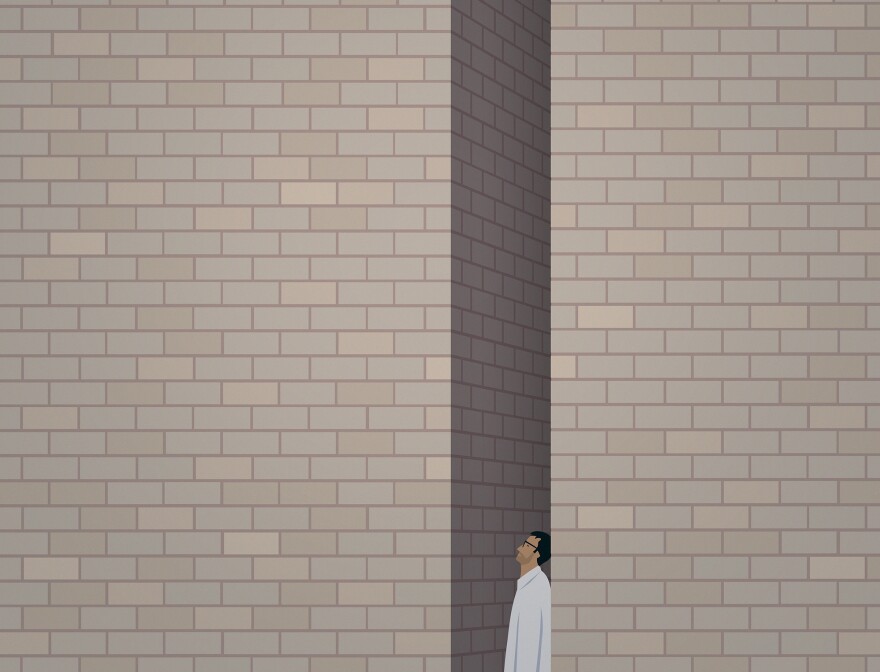My wife was the love of my life. We were together for a dozen years. And then, in 2013, it was over. I was 32 and bipolar, and divorce felt like the end of the world. I was so depressed, I was hospitalized.
Friends told me I needed time away to begin to heal. They helped me move to Dubai, where I could be with family. But weeks passed and I hardly recovered. I was no longer suicidal, it's true. But I didn't really care if I was alive, either.
Loved ones insisted that I should keep living until one day I'd want to. So every 40 days, I'd drive to the nearest international border to get a new tourist visa. Each time, I'd leave Dubai, promptly make a U-turn and come back in with another 40 days to find a reason to live.
I was always nervous on these journeys. I'd lost 60 pounds in the years since my passport picture had been taken and I hardly looked like myself. Each time I approached a border, I feared I'd be denied a visa or, worse, deported.
On just one such trip, everything was going deceptively smoothly: I pulled up to a police officer sitting on what looked like a lawn chair, outside what looked like a tollbooth. He wore gold-rimmed Ray-Bans and appeared not to have a care in the world.
When I handed over my passport, he flipped to the photograph page and burst out laughing. That seemed to be it, though. He wordlessly stamped my passport, and waved me forward.
But I was not 15 minutes into my drive back to the city when the car behind me — license plates from Oman — flashed its headlights.
The driver gestured for me to pull over. Maybe in the desert wild, he intended to kidnap, kill or eat me. But maybe he just needed help. Car trouble out there could mean death.
We both pulled into the breakdown lane and exited our cars. But as I walked toward him, he started backing up — like he was scared of me.
Keeping his distance, he said: "You go back."
"Go back?" I asked.
"Police say you go back," he explained. Then he dove into his car and rocketed away. I wondered if this was some kind of gambit to steal my car and leave me stranded. But fearing I might be arrested otherwise, I returned to the same tollbooth, and the same officer regarded me with great confusion. Then he smiled, remembering why he'd called me back.
He yelled, "Muhammad!"
Another officer, presumably Muhammad, rushed over. "Show him your passport," the tollbooth officer told me.
My jaw all but fell to the floor. The officer had deputized the citizen of another country ... just to show his friend my picture? Before I could say anything, he snatched my passport and opened the picture page for Muhammad.
"You were so fat!" the officer cried.
Muhammad laughed, then turned deadly serious. "How did you lose so much weight?"
He asked with genuine curiosity.
What was I going to say? That the doctors' best guess was that I had an autoimmune disorder? That I lost my job, my savings, my apartment, my wife — my reasons to go on living? That I hardly cared how I looked or if I ate?
Instead I did the Muslim equivalent of throwing my hands in the air. "Alhamdulillah," I said — Arabic for, Praise the Lord.
I'd whispered it, lending the moment a sacred aura I'd not intended.
In Dubai they suffer "first world problems." But they process them with 7th century spirituality. "Alhamdulillah," the officers repeated, transformed.
It was as though they'd never laughed at me at all. We might have come from different ends of the earth, but in that brief moment we became one.
And then the encounter was over.
On the drive back, I suddenly burst out laughing. I hadn't laughed that hard since my divorce. I didn't think I ever would. But the whole thing was so ridiculous. I knew then that I'd tell everyone what had happened. I'd pass my passport around too, for dramatic effect.
And then it hit me. Alongside the pain of the past and the numbness of the present, there was something else: I knew I wanted to stick around long enough to tell this story.
Haroon Moghul is a Fellow in Jewish-Muslim relations at the Shalom Hartman Institute, in Manhattan, and now lives in New York. His memoir How to be a Muslim: An American Story is now out in paperback.
Copyright 2021 Fresh Air. To see more, visit Fresh Air.

